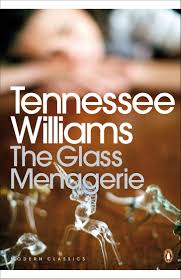The Glass Menagerie by Tennessee Williams, USA, 1944

Beautifully created and written, this short one-act play can be appreciated on many different levels. The mother, Amanda Wingfield, is still trapped in the days of her youth when she was a sought-after southern belle; she wants the best for her children, but ‘best’ is a word qualified by her own needs and her own experiences. The son, Tom Wingfield (who also acts as the narrator), works in a shoe warehouse. His goal is to become a poet, but he is caught in a job he hates while he shoulders the responsibility for his mother and sister. He wants to be able to flee the situation, the same as his father did years before. The sister, Laura Wingfield, is older than Tom but fragile and lacking in self confidence. She collects small animals made of glass, things that are just as fragile as herself. Jim O’Connor, the gentleman caller, went to school with both Tom and Laura. Then, it looked as though he was headed for great things, but now, several years on, he is working at the same warehouse as Tom. However, in spite of his obviously mundane job, he is studying and he is hoping to make something of himself.

While Tom is a reflection of Tennessee Williams, Amanda, Laura and the absent Mr Wingfield are all reflections of Williams’ own family. This play is said to be the most autobiographical of all of Tennessee Williams’ writings. It is referred to as a ‘memory play’, and it was Williams himself who coined the term ‘memory play’ when he wrote The Glass Menagerie – the events of the play being narrated, from memory, by one of the lead characters, in this case, Tom. This type of narration gives the play a dreamlike quality where reality and one person’s interpretation of reality are loosely woven together.

While Amanda has her sights set on Jim as a possible husband for Laura, and while the overly shy Laura slowly lets herself be drawn in by the gentleman-caller’s confidence and charisma, Jim’s surprising revelation and the accidental breakage of one of the small glass animals show just how fragile life actually is. Was Jim being completely truthful or was he, like Tom, simply looking to preserve his freedom?